Welcome to my guide on how to get a cat to lick you! If you’re a cat owner, you may have experienced the joy of your feline companion giving you a few licks. But have you ever wondered what it means when a cat licks you? In this article, we’ll explore the reasons behind this behavior and uncover the fascinating insights from experts in the field. So, let’s dive in and unravel the secrets of cat licking!
Key Takeaways
- Cats lick their owners as a form of affection, grooming, and to mark their territory.
- Licking is a way for cats to show love and treat their owners as part of their family.
- By licking their owners, cats are claiming them as part of their territory and signaling to other cats.
- Cats may lick their owners to seek attention or reinforce certain behaviors through positive reinforcement.
- Some cats may lick their owners to teach them hunting skills or provide comfort during times of anxiety or stress.
Why Do Cats Lick Their Owners as a Sign of Affection?
Cats licking their owners is a common behavior that can be seen as a sign of affection. But why do cats lick? Licking is a behavior that cats learn from their mothers when they are kittens. It is a way for them to bond and show love and care. When a cat licks their owner, they are treating them as part of their family and expressing their affection.
A cat’s tongue is designed to groom their fur, and it has unique features that make it ideal for grooming. The tongue is covered in tiny, barbed papillae that help remove dirt and debris from their fur. When a cat licks their owner, it is a way for them to groom and take care of them, just like they would groom themselves or other cats.
Cat behavior and body language can also give clues as to why they lick their owners. If a cat approaches you with their tail up, purring, and rubbing against you before licking, it is a clear indication that they are seeking affection and showing their love. Every cat has their own preferences when it comes to grooming, so some cats may lick more than others. It’s important to pay attention to your cat’s body language and respond accordingly.
| Reasons why cats lick their owners as a sign of affection |
|---|
| To show love and care |
| To bond and treat their owner as part of their family |
| To groom and take care of their owner, just like they groom themselves or other cats |
| To seek affection and show their love |
Why Do Cats Lick Their Owners as a Sign of Affection?
“Cats licking their owners is a way for them to bond and show love and care. Licking is a behavior that cats learn from their mothers when they are kittens. It is a way for them to groom and take care of their owners, just like they groom themselves or other cats.” – Cat Behavior Expert
Understanding why cats lick their owners as a sign of affection can help strengthen the bond between humans and felines. It’s important to reciprocate their affection in a way that they enjoy, such as gentle petting or providing a cozy environment. Remember, every cat is unique, so observe their behavior and preferences to ensure a harmonious and loving relationship.
Section 3: How Does Licking Show that a Cat is Marking Their Territory?
When a cat licks their owner, it could be a sign that they are marking their territory. Cats have scent glands in their cheeks that produce pheromones. By licking and rubbing their cheeks on objects or people, they are leaving their scent behind, effectively marking their territory. This behavior is a natural instinct for cats and a way for them to communicate with other felines.
By licking their owners, cats are claiming them as part of their territory. It’s their way of showing other cats that the owner belongs to them. This behavior can be seen as a form of possession and a means for cats to establish ownership over the people they consider part of their family.
To better understand this marking behavior, it’s helpful to observe the grooming rituals and habits of cats. Grooming is an essential part of a cat’s daily routine, and by licking their owners, cats may be extending this grooming behavior to include the people they perceive as part of their social group.
Overall, when a cat licks their owner, it serves as a way for them to mark their territory and establish a sense of ownership. It’s a behavior that is deeply rooted in feline instincts and a means for cats to communicate their social hierarchy within their environment.
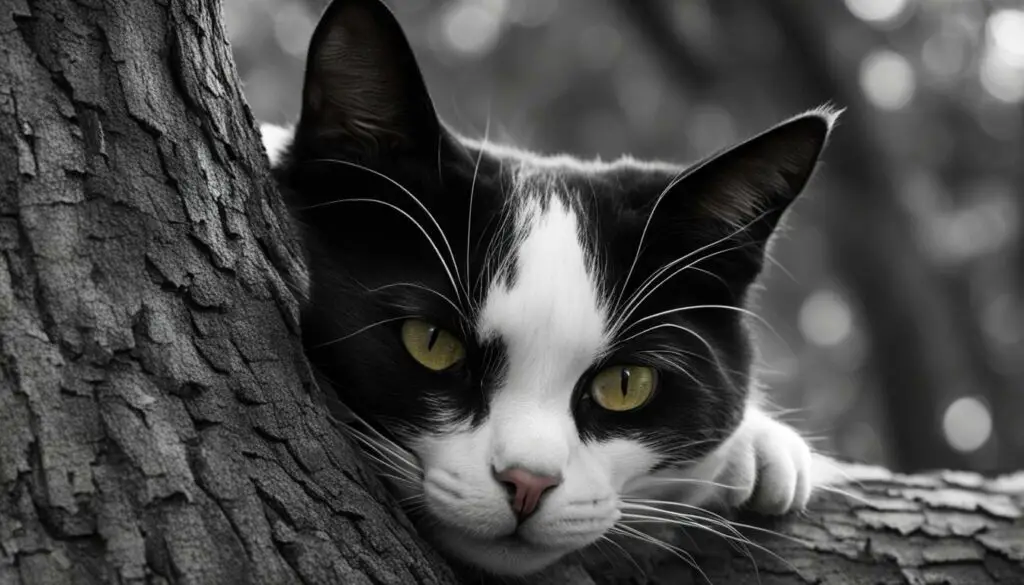
Table: Ways in which cats mark their territory through licking behavior
| Licking Behavior | Description |
|---|---|
| Grooming their owner | Cats lick their owners as a form of grooming, similar to how they groom themselves or other cats. |
| Leaving scent markings | By licking their owners, cats deposit pheromones from their scent glands, effectively marking their territory. |
| Claiming ownership | Cats may lick their owners to establish a sense of possession and to communicate with other cats that the owner belongs to them. |
| Social bonding | Licking behavior can also be a sign of social bonding, as cats groom each other as a way of strengthening their relationships. |
Why Do Cats Lick Their Owners for Attention?
Cats are known for their independent nature, but they also crave attention from their owners. One way they seek attention is through licking. Cats may lick their owners as a way to communicate their needs and desires. They learn that by licking, they can get positive reinforcement in the form of treats, petting, or playtime.
Grooming sessions can also be a bonding experience between a cat and its owner. When a cat licks its owner, it can be a sign of trust and affection. The cat may feel comfortable and safe in the presence of the owner, and licking becomes a way to strengthen their bond. It’s important for owners to reciprocate this affection by providing gentle petting, scratching, and positive reinforcement during these grooming moments.
Cats have a highly developed sense of smell, and they use scent to communicate. When a cat licks its owner, it leaves behind its scent, marking the owner as part of its territory. This not only shows possessiveness but also serves as a form of communication to other cats. The cat is saying, “This person belongs to me.”
| Reasons Why Cats Lick Their Owners for Attention | Examples |
|---|---|
| Desire for food or playtime | A cat licks its owner to indicate that it wants to be fed or to initiate playtime. |
| Seeking physical contact and companionship | Licking is a way for a cat to show its owner that it wants to be close and spend time together. |
| Positive reinforcement | If a cat receives attention or rewards when it licks its owner, it learns that licking is a way to get what it wants. This reinforces the behavior. |
| Using scent to mark territory | Through licking, a cat leaves behind its scent, marking its owner as part of its territory and deterring other cats. |
It’s important for cat owners to understand that licking is a natural behavior for cats and is not something to be discouraged. However, if the licking becomes excessive or bothersome, redirecting the cat’s attention through positive reinforcement with treats or toys can help. Additionally, providing the cat with plenty of physical and mental stimulation can reduce their need for attention-seeking behavior.
Can Cats Lick Their Owners to Teach Them Something?
While cats primarily lick their owners as a form of affection and grooming, some felines may also engage in licking behavior to teach their owners certain skills. Cats see their owners as part of their family and may try to help them learn and improve their abilities. One way they do this is through hunting.
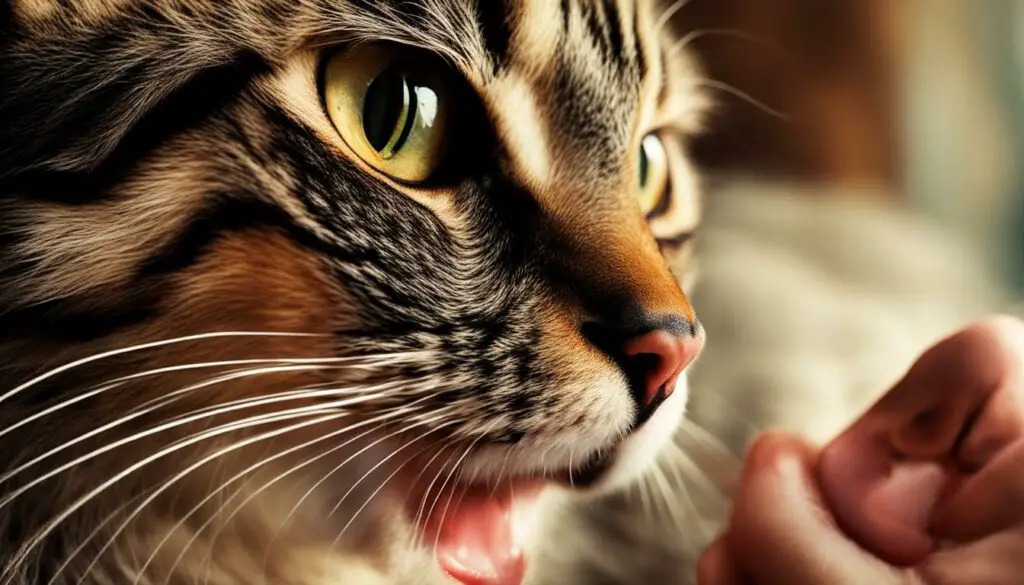
Cats are natural hunters, and they may bring their owners dead prey as a way to share a tasty treat or educate them on hunting techniques. By doing so, they are not only showcasing their hunting prowess but also trying to impart their knowledge to their human companions. This behavior reinforces the bond between cats and owners and allows cats to demonstrate their affection and desire for interaction.
Training Through Playtime
In addition to hunting, cats may also lick their owners during playtime to teach them certain skills. Through interactive play sessions, cats can demonstrate their natural hunting instincts and train their owners on how to engage in stimulating activities together. By chasing toys, pouncing, and swatting, cats can show their owners the importance of agility, coordination, and mental stimulation.
It’s important for cat owners to recognize and appreciate these teaching moments. Engaging in playtime and interactive activities with cats not only enhances the bond between owner and pet but also provides valuable mental and physical stimulation for both parties involved. Understanding that cats may lick their owners to teach them something allows for a deeper appreciation of the unique and enriching relationship between humans and feline companions.
Why Do Cats Lick Their Owners for Comfort?
When it comes to cats, licking can be a comforting behavior that helps them relax and cope with stress or anxiety. Cats have unique grooming rituals and habits that are deeply ingrained in their behavior and psychology. Licking their owners is one way they seek comfort and establish a sense of security.
Grooming rituals in cats involve licking not only themselves but also their feline companions. This instinctual behavior is rooted in their early experiences with their mother, who would groom them regularly when they were kittens. By licking their owners, cats mimic this nurturing behavior and create a bond that promotes feelings of calmness and reassurance.
Furthermore, when cats lick their owners, they engage in an intimate form of communication. Cats have specialized scent glands in their mouths that release pheromones, which can have a calming effect. By transferring their scent through licking, cats create a familiar and comforting environment for themselves and their owners.
| Cat Behavior Modification Tips: |
|---|
| 1. Provide a safe and cozy environment for your cat. |
| 2. Establish a routine to reduce stress and promote a sense of security. |
| 3. Offer plenty of interactive toys and activities to keep your cat mentally stimulated. |
| 4. Use pheromone diffusers or sprays to create a calming atmosphere. |
When your cat licks you for comfort, it’s important to reciprocate this bonding behavior by providing gentle strokes and body contact. This physical interaction can further enhance the sense of security and relaxation for both you and your cat. However, if your cat’s licking becomes excessive or you have concerns about their behavior, it’s best to consult with a veterinarian to rule out any underlying medical issues.
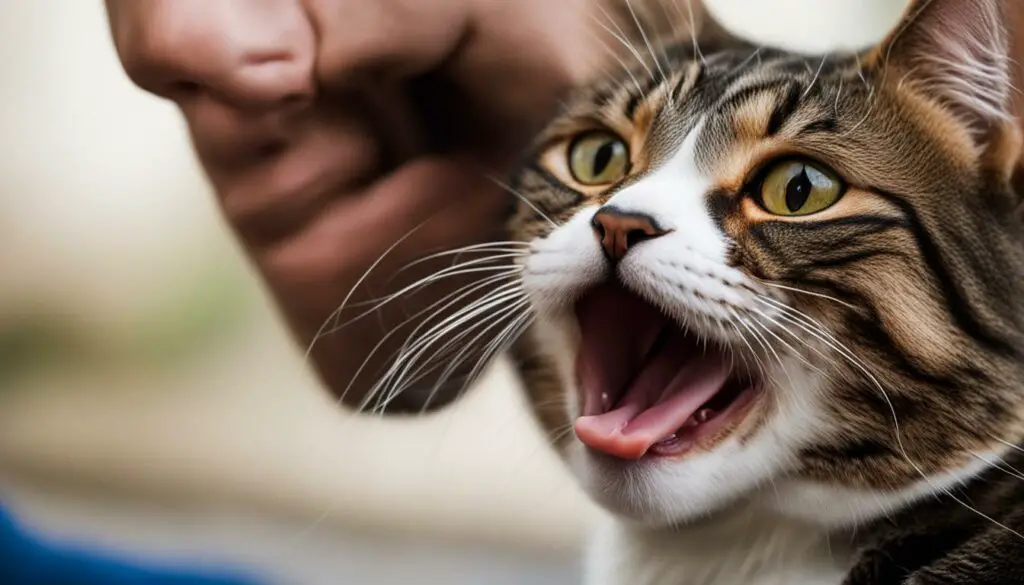
“Cats have unique ways of seeking comfort, and licking their owners is just one of them. This behavior not only serves as a grooming ritual but also strengthens the bond between cats and their human companions.” – Dr. Smith, Veterinarian
What Does It Mean If a Cat Licks You Because of a Tasty Smell?
It’s not uncommon for cats to lick their owners if they detect a tasty smell on their skin. Cats have a strong sense of smell, and certain scents can be quite enticing for them. For example, if you’ve been handling fish, meat, or other foods that cats enjoy, your furry friend may be attracted to the smell and try to lick it off your skin.
This behavior is driven by the cat’s preference for certain scents and flavors. It’s important to note that cats have specific grooming rituals, and licking is a part of their natural behavior. When they lick you because of a tasty smell, it’s their way of showing interest and possibly even trying to share in the delicious experience.
While it may be tempting to discourage this behavior, it’s essential to understand that it’s a part of your cat’s natural instincts. Instead of trying to stop them from licking you, you can redirect their attention to appropriate grooming activities. Providing them with toys or treats that they can focus their licking behavior on can be a helpful strategy and a great way to engage with your cat.
| Pros | Cons |
|---|---|
|
|
Overall, if your cat licks you because of a tasty smell, it’s a sign that they are curious and engaged with you. It’s important to embrace this behavior as a part of your relationship with your furry friend and find ways to redirect their attention when needed. By understanding and respecting your cat’s natural instincts, you can strengthen the bond between you and your feline companion.
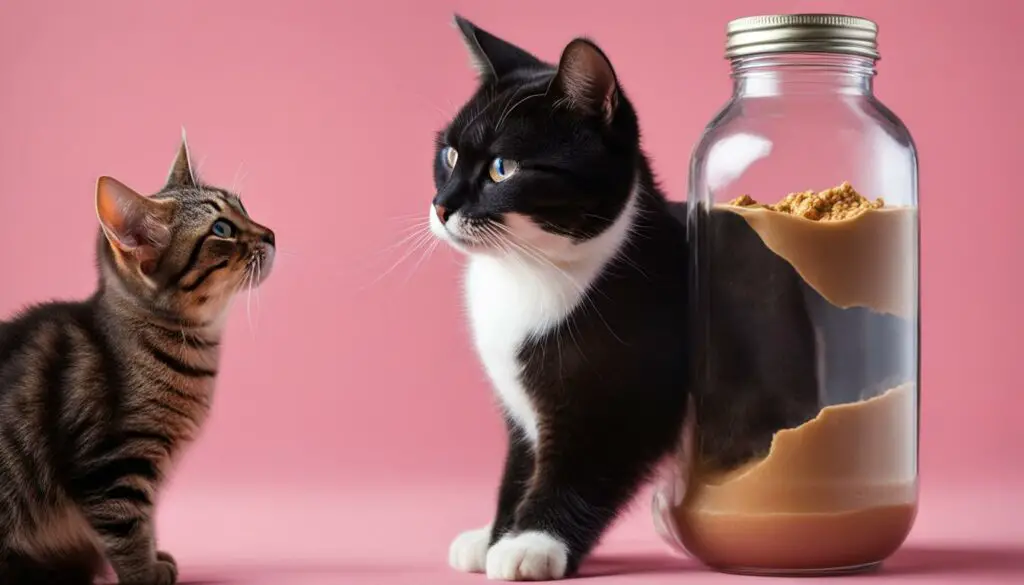
Is It Safe to Let Your Cat Lick You?
Many cat owners enjoy the feeling of their cats licking them as a sign of affection. While it is generally safe to let your cat lick you, there are a few things to consider to ensure your safety and the well-being of your cat.
Cat mouths contain bacteria that can potentially make humans sick, so it is important to avoid letting them lick open wounds on your body. If you have any cuts or scratches, it’s best to keep them covered and prevent your cat from licking them. Additionally, people with compromised immune systems should be cautious about allowing cats to lick them, as they may be more susceptible to infections.
It’s also important to be mindful of any lotions or topical medications that you may have on your skin. Some ingredients in these products can be harmful if ingested by your cat. To be on the safe side, it’s always a good idea to consult with a veterinarian if you have any concerns or if your cat has a habit of licking you after you have applied lotions or medications.
| Is It Safe to Let Your Cat Lick You? | Precautions |
|---|---|
| Cat mouths | Avoid letting them lick open wounds |
| Compromised immune systems | Be cautious about allowing cats to lick |
| Lotions or topical medications | Consult with a veterinarian for advice |
“While it is generally safe to let your cat lick you, it’s important to take precautions to ensure both your safety and your cat’s well-being.”
Overall, as long as you are mindful of any potential risks, it is safe to let your cat lick you. It can be a bonding experience and a way for your cat to express affection. However, if you have any concerns or if your cat’s licking behavior becomes excessive or out of character, it’s always a good idea to consult with a veterinarian for guidance.
Why Does Cat Licking Feel Uncomfortable?
Cat licking, while a common behavior, can sometimes feel uncomfortable for humans. The rough sensation of a cat’s tongue is due to the presence of backward-facing hooks called papillae. These tiny spines, made of keratin, create a sandpaper-like texture that is ideal for grooming their fur but can be less than pleasant when directed towards human skin.
The papillae on a cat’s tongue serve as grooming tools, helping them to remove dirt, debris, and loose fur from their coats. While this rough texture may be soothing and comforting for cats, it can cause mild discomfort for the person being licked. It’s important to note that the intensity of the sensation can vary depending on the individual cat and the specific licking behavior.
“The rough sensation of a cat’s tongue against human skin is often described as similar to being scraped with sandpaper.”
Despite the potential discomfort, it’s important to remember that cat licking is not meant to be harmful or aggressive. Cats engage in grooming behaviors as a form of bonding and communication. While the rough texture of their tongues may not always be pleasant, it’s a sign that your cat sees you as part of their family and is expressing their affection and care.
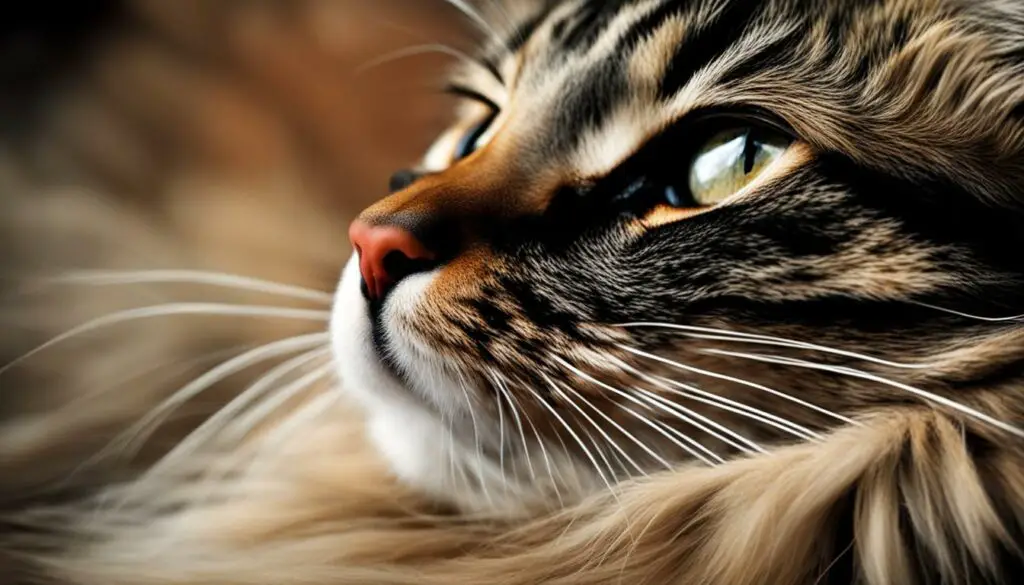
Understanding the Cat’s Perspective
From a cat’s perspective, licking is a natural and instinctual behavior. It serves multiple purposes, including grooming, marking territory, and social bonding. While the rough texture of their tongues may not be ideal for human comfort, it’s important to respect and appreciate the intentions behind the behavior. If the sensation becomes too uncomfortable, there are strategies to redirect your cat’s attention and discourage excessive licking.
Keep in mind that every cat is unique, and their individual preferences and behaviors may vary. If you have concerns about your cat’s licking behavior or discomfort caused by it, consult with a veterinarian for guidance and advice tailored to your specific situation.
When Should You Be Concerned About Your Cat Licking You?
If your cat frequently licks you, it’s usually a sign of affection and bonding. However, there are times when you should be concerned about your cat’s licking behavior. Excessive licking can indicate an underlying medical issue or anxiety that needs attention. Here are some situations where you should seek veterinary advice:
1. Medical Issues:
If your cat suddenly starts licking you excessively, it could be a sign of a medical problem. Cats may lick excessively due to nausea, pain, discomfort, allergies, or skin infections. Monitor your cat for any other symptoms, such as vomiting, diarrhea, or changes in appetite, and consult with a veterinarian if you have concerns.
2. Anxiety:
If your cat’s licking behavior is accompanied by other signs of anxiety, such as pacing, hiding, excessive meowing, or aggression, it may indicate that your cat is stressed. Cats can develop anxiety due to changes in their environment, routine, or social interactions. Consult with a veterinarian or a feline behavior specialist to address the underlying cause of your cat’s anxiety and provide appropriate treatment.
3. Excessive Licking:
If your cat’s licking behavior becomes obsessive and interferes with their daily activities or causes skin irritation, it may be a sign of compulsive behavior or a medical condition known as psychogenic alopecia. Psychogenic alopecia is a stress-related condition that leads to excessive licking and hair loss. A veterinarian can help diagnose the underlying cause and develop a treatment plan to manage the excessive licking behavior.
Remember, while occasional licking is normal for cats, any significant changes in behavior should be taken seriously. Seeking professional advice can help ensure your cat’s well-being and address any underlying issues that may be causing the excessive licking.
Can You Stop Your Cat From Licking You?
If you find your cat’s licking behavior bothersome, there are several strategies you can try to discourage it. One effective approach is to provide distractions for your cat. Offer interactive toys, such as puzzle feeders or feather wands, to redirect their attention away from licking and onto play. Additionally, introducing a scratching post or vertical climbing tree can provide an alternative activity for your cat.
Another method is to use clothing as a barrier. Wear long sleeves or cover exposed skin when interacting with your cat to limit their access to areas they tend to lick. By creating this physical barrier, you can discourage the behavior and redirect their focus elsewhere.
Negative reinforcement can also be effective in stopping your cat from licking you. When your cat licks you, calmly and gently remove yourself from the situation. This sends a clear signal that licking results in a loss of attention or interaction. Over time, your cat will learn that licking is not an effective way to engage with you.
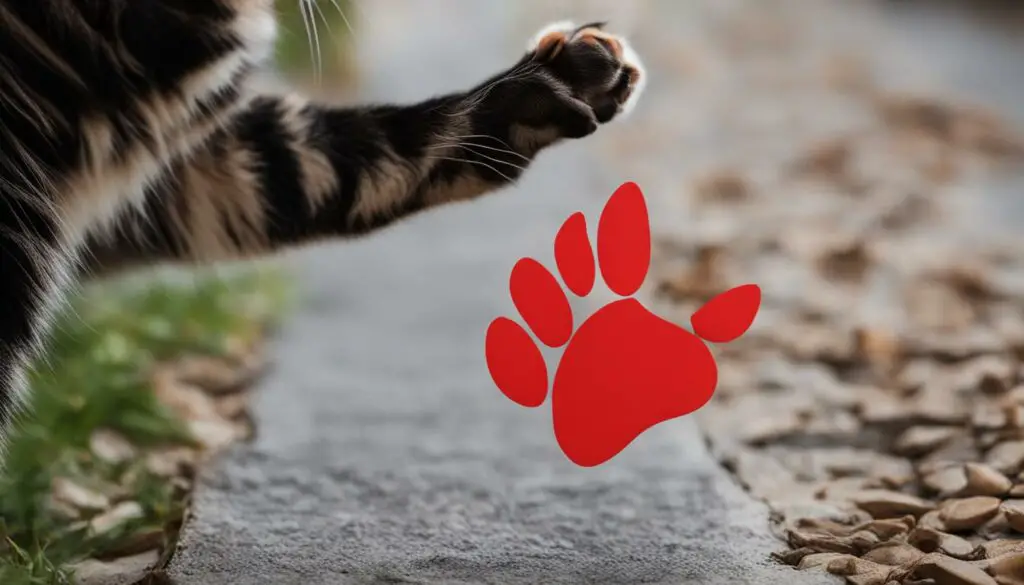
Common Strategies to Stop Cat Licking
- Provide distractions with interactive toys
- Introduce a scratching post or vertical climbing tree
- Wear long sleeves or cover exposed skin
- Use negative reinforcement by removing attention when licked
The Science Behind Cat Licking and Papillae
When your cat licks you, you may feel the rough texture of their tongue, which resembles sandpaper. This unique sensation is due to the presence of papillae, small spines made of keratin, on the surface of a cat’s tongue. These papillae act as grooming tools, helping cats clean and maintain their fur.
The roughness of a cat’s tongue is essential for their grooming routine. As they lick themselves, the papillae catch dirt, debris, and loose fur, effectively removing them from their fur. This self-grooming behavior helps keep a cat’s coat clean and healthy.
But why does a cat’s tongue have this sandpaper-like texture? The roughness is attributed to the backward-facing hooks on the papillae. These hooks are designed to pull through the fur, untangling knots and removing any foreign particles that may have accumulated. The papillae also distribute natural oils produced by the cat’s skin, providing moisture and shine to their fur.
In addition to grooming, a cat’s tongue also serves other purposes. The papillae assist cats in tearing and consuming their prey, as well as licking up water. So, the next time your cat licks you, remember that it’s not only a sign of affection or grooming but also a natural behavior driven by their unique papillae.
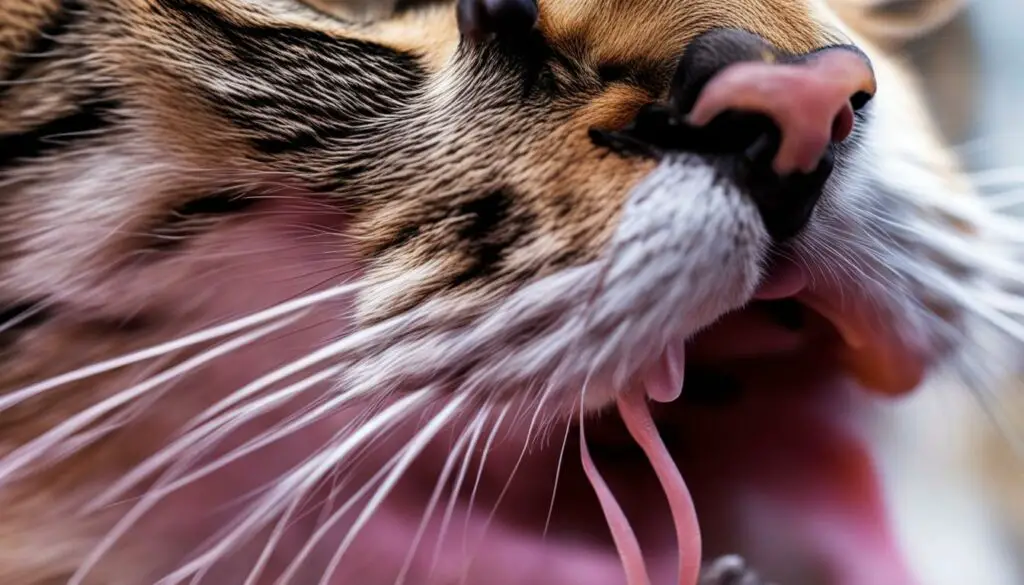
The Role of Papillae in Cat Behavior
Beyond grooming, a cat’s rough tongue plays a role in their behavior and communication. Cats use their tongues to mark objects and people with their scent. By licking you, they are leaving their scent on your skin, essentially claiming you as part of their territory. This behavior is a way for cats to communicate with other felines and establish ownership.
The presence of papillae on a cat’s tongue also affects their eating habits. The rough texture helps them remove meat from bones and scrape every last bit of food from their bowls. It’s a remarkable adaptation that aids in their ability to consume their prey efficiently.
In summary, the rough texture of a cat’s tongue, caused by the papillae, is a fascinating aspect of feline anatomy. These specialized structures serve a variety of purposes, from grooming and removing debris from their fur to marking territory and aiding in eating. So, the next time your cat gives you an affectionate lick, take a moment to appreciate the incredible science behind their unique tongues.
Conclusion
After exploring the reasons why cats lick their owners, we can conclude that licking is a multi-faceted behavior that serves as a way for cats to bond, groom, mark their territory, communicate, and seek comfort. When a cat licks you, it is a sign of affection and acceptance, as they treat you like a beloved family member.
Grooming is a significant aspect of a cat’s behavior, and licking plays a crucial role in maintaining their hygiene. By licking themselves and their owners, cats remove dirt, debris, and odors from their fur, ensuring cleanliness. While their rough tongues may feel uncomfortable to us, it is an essential part of their natural grooming routine.
However, if your cat’s licking behavior becomes excessive or causes concern, it may be indicative of an underlying medical issue or anxiety. Monitoring your cat’s behavior and consulting with a veterinarian can help address any potential problems. Additionally, if you find your cat’s licking bothersome, you can employ distraction techniques, positive reinforcement, or clothing to deter the behavior.
In conclusion, cat licking is a normal and instinctual behavior that demonstrates their affection, grooming habits, and desire for interaction. Understanding the reasons behind this behavior can help foster a stronger bond between you and your feline companion.
FAQ
How can I get my cat to lick me?
You can encourage your cat to lick you by providing a relaxed and safe environment, using gentle petting motions, and offering positive reinforcement with treats or praise.
Is it common for cats to lick their owners?
Yes, it is common for cats to lick their owners as a form of affection, grooming, and communication.
Why do cats lick their owners?
Cats lick their owners as a sign of affection and bonding, to mark their territory, for attention, to teach hunting skills, for comfort, and because of tasty smells on the owner’s skin.
Is it safe to let my cat lick me?
Generally, it is safe to let your cat lick you, but precautions should be taken to avoid letting them lick open wounds or ingesting harmful substances.
Why does cat licking feel uncomfortable?
Cat licking can feel uncomfortable because of the rough texture of their tongues, which is designed for grooming their fur but may be abrasive on human skin.
When should I be concerned about my cat’s licking behavior?
Excessive or out-of-character licking behavior may indicate an underlying medical issue or anxiety, and it’s important to monitor your cat’s behavior and consult with a veterinarian if you have concerns.
Can I stop my cat from licking me?
You can discourage your cat from licking you by using distraction techniques, redirecting their attention, or providing negative reinforcement such as ignoring the behavior.
What are papillae, and why do they make a cat’s tongue feel rough?
Papillae are backward-facing hooks on a cat’s tongue that provide a rough texture, essential for grooming their fur by removing dirt and debris.
Source Links
- https://www.thesprucepets.com/why-does-my-cat-lick-me-551816
- https://be.chewy.com/behavior-pet-body-language-why-does-my-cat-lick-me/
- https://petmd.com/cat/behavior/evr_ct_why-does-my-cat-lick-me








